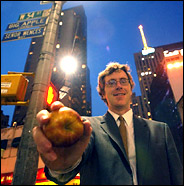August 29, 2004
Shaking 'The Big Apple' Out of History's Convoluted Tree
By
day, Barry Popik is a New York administrative law judge who handles
things like parking violations. By night, he is an amateur etymologist
who has traced the origin of thousands of words and phrases. 
One of Mr. Popik's specialties is New York, and his crowning achievement was tracing the nickname "The Big Apple," along with Gerald Cohen, a professor of languages at the University of Missouri-Rolla.
The expression was popular among Harlem jazz musicians in the 1930's, and lent its name to a dance craze of the time. But Mr. Popik and Mr. Cohen found its earliest written usage in 1921, in a horse-racing column by John J. Fitz Gerald of The New York Morning Telegraph, who said he heard it from New Orleans stable hands as a reference to the big money racing tracks.
Mr. Popik, 42, has fought for recognition even though the finding is listed in The Encyclopedia of New York City. He still contends with what he calls public indifference, and an Internet hoax claiming the phrase originated from a bordello. That claim, at www.salwen.com/apple.html, is a spoof, according to one of its creators. To Mr. Popik's chagrin, the misnomer is mentioned on the Web site of the Big Apple Fest, an exhibit of apple sculptures scattered around the city through Oct. 15.
Mr. Popik took his work online at www.barrypopik.com in advance of the festival. He discussed his travails at a bookstore near his East Side apartment:
I'm from Rockland County, north of New York City. My parents were both born in Brooklyn. From my little house in Rockland County I could see the Empire State Building. Even there.
Suburban life was interesting, but it was very boring, especially when I grew up in the 60's and the 70's. We had no Internet, and you had to walk for a long time to get to a library. So I said, gee, I want to go somewhere like New York, where I can go to the New York Public Library and have all these riches.
I was always interested in the history of words and phrases. One day years later when I was in the New York Public Library, I met Gerald Cohen, who was putting the final touches on his monograph on the meaning of the phrase "The Big Apple." When he showed me what he had, I said: "Wait a minute, this is good, but we can do much better than that."
Eventually I became recognized for my work, but it's been much slower than I'd like. I wanted to be married by now and have kids, which would have been nice. But it's just the way it works out.
For some reason people believe Gerald Cohen, because he's a professor and I'm not. I'm a parking ticket guy and I just happen to live here, and he's a professor in Missouri. Plus, he's a second person. One person, maybe he's a nutcase, but a second person, he's a professor, you believe it.
I started the Web site in July, pulling stuff out of my archives. It was hard because I did this research such a long time ago and my work is all over my apartment. But finally people at least have a source for "The Big Apple."
What I still get is, people say why an apple? Why not a banana? And my answer is that's what John J. Fitz Gerald says. He's the guy, he's dead, and I accept it. Pretty much what I know is that horses love apples; the apples were a reward.
The first citation, the first time someone says, "We's going to the Big Apple," no one's going to care. No one's going to care until John J. Fitz Gerald names his column that. It's kind of like a game. We're just getting pieces, and adding to it and creating a language. That's what I like about it. It would be nice if you won prizes. But whatever.